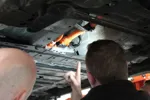By Rob Golding and Jeremy Bennett
It used to be the case that the job of the new car salesman was to make a judgement as to how much the customer in front of him could afford to spend and then concentrate on achieving maximum income for his company and best possible bonus for himself.
That strategy is breaking down, according to the major players in the business.
For a start, the customer has the internet in his pocket and is able to retaliate immediately if he thinks he is not being offered the car he wants at the price he considers fair.
He can whip out his mobile phone and show the salesman immediately what his competitors are offering on the web. He has the upper hand.
The salesman has lost trust and needs to make some significant gestures to regain it.
Far from being able to price the car and then add the options at full price he is now on the back foot.
Jennifer Cader, who works for the Ford Retail business in the UK, puts it succinctly: “Customers now have done the research online; they know what the best price is that they can achieve.
“Our job is to establish why they have come, discuss the finance options and talk about cash percentages and the part-exchange value.
“We will discuss their lifestyle needs, or the business usage of the specific car that interests them – perhaps get more about their family needs.”
The salesman will be armed with background transactions to establish whether there is a meeting of minds between himself and the customer; and after the deal is done he will ask for feedback to make sure the customer is content.
All sales staff have bonuses and commission to consider.
The dealership will have logged comparable transactions.
The 40 largest dealer groups in the UK all buy technical help produced by Glass’s Guide.
Nathan Elliott has joined Glass's, following the depature of Adrian Rushmore (who recently left Glass’s to join CAP) and is responsible for ensuring the dealer groups see value in the stats that Glass’s prepares and sell.
“We are a partnership with the dealers. We try to deal with areas where they have a problem.
"They see us as consultants and we produce a number of digital information briefings as well as the famous hard-copy pocket guide.
“If they are struggling for stock or struggling to get customers through the door we will brief them on rival web offers and valuations.”
Glass’s now also has Glass Net Radar which enables dealers to compare their prices with those of local rivals.
Elliott has seen a huge change in dealer behaviour which has been forced by the transparency of information now that it is all instantly available on the web.
“Customers used to walk into a dealership with their guard up, expecting a confrontational relationship.
"That has gone, or is going.
"Dealers know that if they do not respond quickly to what customers want, or respond in a self-interested manner, the customer will walk.
"“With the larger dealers – those in the AM100 – this does not now happen very often.
"I have been in the auto industry only for the past four years and there has been a massive change over that time.
“We used to sell air-conditioning, leather and big wheels, but now as an industry we ask them what they require.
"The customer is a lot more educated than he used to be.
"It is pretty rare that he doesn’t know what he wants and what is available.
"Days are long gone when someone walks into a showroom unprepared and walks out with something unsuitable.
Customers for life
Manil Seebaluck has been in the same sales job with Ford for the last nine years.
He is the sales manager for Dagenham Motors in Enfield – one of the Ford Retail Group.
“After that sort of length of time you break the mould and you are seeing the same customer come back to you.
“Ford has changed its approach.
"We do now make customers for life.
"We are seeing the same customers over and over again.
"You cannot put a value on that first transaction.
"I firmly believe that.”
Trust means that you can become the customers’ friend.
“We can ring them two or three years into their finance agreement and tell them that they can have a new car for the same money.
“It is quite important that you get to them first.
"They do not want propositioning by three of four salesmen.
"We all try to do the same sort of thing and it is the lifeblood of the business.
"“Customers like that, provided you can make the transaction hassle-free,” he said.
Incentives and bonusing in the retail industry have changed a lot over the years because volume is the great driver rather than profit.
So many of the UK car providers now manufacture overseas that delivery times are lengthy and customers are too impatient to wait.
That makes it vital that the salesman can sell from stock.
And the consequence of that is that the dealer has to carry the widest possible range to appeal to all tastes.
It’s a challenge – particularly in the big city territories where storage space is prohibitively expensive.
London is a challenge all its own.














Jeff Jarvis. jeffjarvis@fsmail.net - 20/05/2013 15:15
Good God, Have you all been asleap for the last 35years? Nothing has changed.